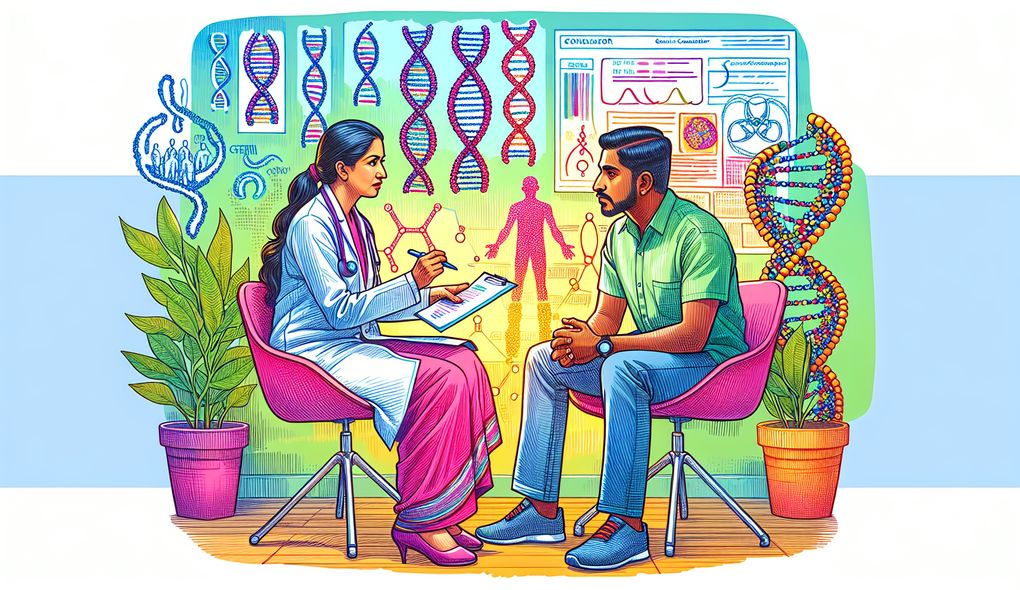Explain the importance of empathy and sensitivity to patients' needs and concerns in the role of a Genetic Counselor.
JUNIOR LEVEL

Sample answer to the question:
Empathy and sensitivity to patients' needs and concerns are crucial in the role of a Genetic Counselor. Patients often seek genetic counseling during challenging and emotionally charged situations, such as a family history of genetic conditions or a recent diagnosis. As a Genetic Counselor, it is essential to create a safe and supportive environment where patients feel comfortable sharing their fears, concerns, and hopes. By practicing empathy, you can better understand and validate their emotions, providing the necessary support they need. Sensitivity is equally important to acknowledge the unique experiences and cultural backgrounds of each patient, as this can influence their understanding and decision-making process. By being empathetic and sensitive, Genetic Counselors can establish trust, foster effective communication, and provide personalized care for patients and their families.
Here is a more solid answer:
Empathy and sensitivity play crucial roles in the daily interactions of a Genetic Counselor. Patients often come to us during times of uncertainty and heightened emotions. By showing empathy, we can create a space where patients feel understood and supported. This allows us to establish trust, which is foundational to effective communication and collaboration. Sensitivity is equally important as it helps us respect and honor each patient's unique experiences and needs. By considering their cultural backgrounds, values, and beliefs, we can deliver personalized care that aligns with their individual circumstances. In my previous role, I encountered a patient who was hesitant to undergo genetic testing due to cultural barriers. Through empathy and sensitivity, I was able to address their concerns, provide culturally appropriate information, and support them in making an informed decision. This experience reinforced my belief in the power of empathy and sensitivity in positively impacting patient outcomes and facilitating the best possible care.
Why is this a more solid answer?
The solid answer expands on the importance of empathy and sensitivity by providing a specific example from the candidate's previous role. It demonstrates their understanding of how these qualities can be applied in practice and highlights the positive impact they can have on patient outcomes and personalized care. However, the answer could be further improved by discussing the role of empathy and sensitivity in patient advocacy and ethical decision-making.
An example of a exceptional answer:
Empathy and sensitivity are fundamental qualities for a Genetic Counselor, enabling us to provide holistic and patient-centered care. As Genetic Counselors, we often navigate sensitive topics, such as the risk of genetic disorders within families. By demonstrating empathy, we create an environment where patients feel heard, understood, and supported throughout their genetic counseling journey. Sensitivity is essential, especially when discussing culturally sensitive topics or exploring emotionally challenging genetic information. In my prior experience, I worked with a family from a culturally diverse background who had contrasting beliefs about genetic testing. By leveraging empathy and sensitivity, I facilitated open and respectful dialogue, providing them with the necessary information to make informed decisions while honoring their cultural perspectives. Additionally, empathy and sensitivity contribute to patient advocacy by ensuring that patients' preferences, values, and goals are integrated into their care plans. Moreover, these qualities guide ethical decision-making, allowing us to navigate complex situations with compassion and to address the psychological and emotional aspects of genetic testing. This comprehensive approach enhances patient satisfaction, trust, and ultimately, improves patient outcomes.
Why is this an exceptional answer?
The exceptional answer provides a detailed and comprehensive understanding of the importance of empathy and sensitivity in the role of a Genetic Counselor. It goes beyond the basic and solid answers by discussing the role of empathy and sensitivity in patient advocacy, cultural sensitivity, ethical decision-making, and patient outcomes. The answer also includes a specific example that showcases the candidate's ability to apply empathy and sensitivity in a challenging situation with a culturally diverse family. Overall, this answer demonstrates a deep understanding of the significance of empathy and sensitivity in the context of a Genetic Counselor role.
How to prepare for this question:
- Reflect on your own experiences where empathy and sensitivity had a positive impact on patient care.
- Research and familiarize yourself with different cultural beliefs and practices to enhance your sensitivity to diverse patient populations.
- Enhance your active listening skills to better empathize with patients and understand their unique needs.
- Consider the ethical implications of genetic counseling and how empathy and sensitivity can guide ethical decision-making.
- Stay updated on current research and practices related to genetic counseling to ensure you provide the most comprehensive and up-to-date care.
What are interviewers evaluating with this question?
- Empathy
- Sensitivity
- Patient advocacy

